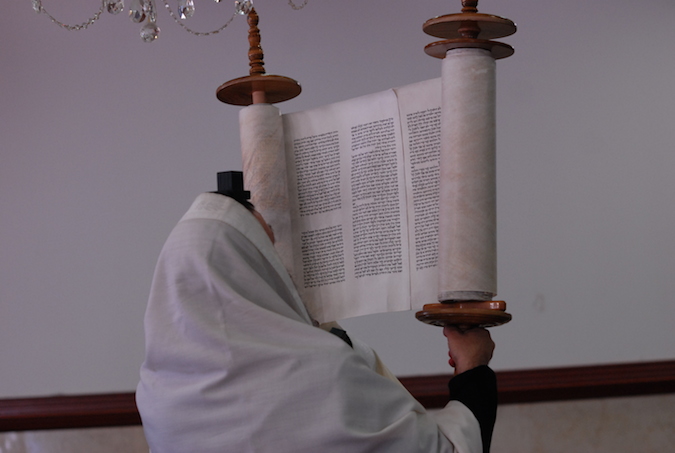Candlelighting, Readings:
Candles: 4:24 p.m.
Torah: Gen. 23:1-25:18
Haftarah: I Kings 1:1-31
Havdalah: 5:24 p.m.
The fascinating marriage of Isaac and Rebecca — from the circumstances surrounding their arranged nuptials to the devastating family split over their twin sons’ bitter rivalry — contains vital lessons for couples in every generation. On the one hand, the Torah’s description of the tenderness of their marriage is extraordinary: “And Isaac brought [Rebecca] into the tent of his mother, Sarah… and [Rebecca] became his wife; and he loved her. And Isaac was comforted over the loss of his mother” [Genesis 24:67].
The Torah also mentions the impassioned prayers of Isaac on behalf of Rebecca, who was struggling with infertility [Gen. 25:21], as well as their lovemaking while in the land of Gerar [Gen. 26:8].
Nevertheless, and tragically, what seems to be missing from their relationship is ongoing communication. Perhaps there is no better evidence for the distance between them than their unverbalized dispute surrounding the spiritual blessings to be bequeathed from father to son.
Differences of opinion between parents will always exist, but if the father prefers Esau and the mother prefers Jacob regarding an issue as momentous as who will don the mantle of spiritual heir to Abraham, ought there not be a discussion and an opportunity to examine the true nature of their sons’ very different characters in order to arrive at a consensus?
Instead, Rebecca resorts to ruse, casting the otherwise-guileless Jacob into a role of deception for which he is unsuited. Not only does he perpetrate a deceit that will haunt him for the rest of his life, but what begins as a split between brothers comes to signify the far greater division between Jews and gentiles throughout history.
Why must Rebecca resort to deception? Why could she not simply have worked this out with Isaac? We must go back to the initial encounter between Isaac and Rebecca, reflecting the gulf that separates them. Isaac had been meditating in the fields, and “When Rebecca … saw Isaac, she fell from the camel. She asked the servant [Eliezer]: ‘What man is this walking in the field to meet us?’ And the servant responded, ‘It is my master.’ And she took her veil and covered herself” [Gen. 24:62-65].
The Netziv, Rabbi Naftali Tzvi Berlin, in his commentary Ha’Emek Davar, explains that Rebecca fell because she had never before seen a religious personality, a spiritual persona who communed with nature and actually spoke before God. So awesome was the sight of Isaac transformed by prayer that she was literally knocked off her feet. Compared to the lying and cheating world of her father, Betuel, and her brother, Laban, Isaac projected a purity with which Rebecca had no previous experience.
When Eliezer revealed the man’s identity, she took the veil and covered herself, not only as a sign of modesty, but as an expression of her unworthiness. From that moment on, the veil between them was never removed. She felt she could never speak to her husband as an equal. She never felt that she had the right to offer a dissenting opinion. But why was Isaac unable to bridge the gap?
The harrowing experience of the Akedah left Isaac in a permanent state of shock. In fact, a part of him always remained behind on Mount Moriah, as hinted at in the final verse of the Akedah: “Abraham returned …” [Gen. 22:19], but where is Isaac? Why is he not mentioned? The verse alludes to the fact that only Abraham came down from the mountain while Isaac, or something about Isaac, remained behind. After the Akedah the traumatized Isaac became silent, non-communicative, leading Elie Wiesel to call Isaac the first survivor.
If neither Isaac nor Rebecca could speak openly with each other, there could be no real communication between them.
In my many years of offering marital counseling, I am never put off when one partner screams at the other. Of course, I am not advocating shouting, but a far more serious danger-sign is silence, a couple’s non-communication.
A crucial lesson, then, from the marriage of Isaac and Rebecca is that we must spend a lifetime working on ourselves and on our relationship with our spouse. Most importantly, we must be honest with ourselves and honest with our spouse: loving them as we love ourselves, and learning how to disagree lovingly and respectfully.
Rabbi Shlomo Riskin is chief rabbi of Efrat and chancellor of Ohr Torah Stone.
The New York Jewish Week brings you the stories behind the headlines, keeping you connected to Jewish life in New York. Help sustain the reporting you trust by donating today.





